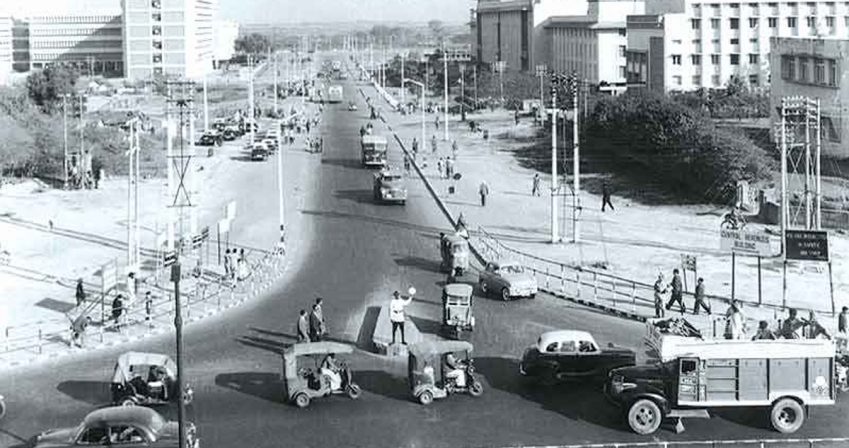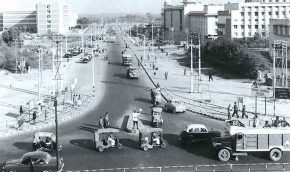Barrister, diplomat, editor, novelist, poet, philosopher and columnist and one of the most dynamic figures in modern India.
Celebrating Diversity at the Bar
- Introduction
- Diversity Timeline
- Edward Akufo-Addo
- Obafemi Awolowo
- Joyce Bamford-Addo
- Solomon Brandaranaike
- Charlotte Boaitey-Kwarteng
- Joseph Ephraim Casely Hayford
- Eugenia Charles
- S Chelvan
- Thomas Morris Chester
- Learie Constantine
- Edward Cragg Haynes
- Patricia Dangor
- Coomee Rustom Dantra
- Gifty Edila
- Ezlynn Deraniyagala
- Taslim Olawale Elias
- Martin Forde
- Arthur Dion Hanna
- Ma Pwa Hmee
- Alexander Isbiter
- Sibghatullah Kadri
- Seretse Kharma
- Moleleki Didwell Mokama
- Tunde Okewale
- Ashitey Ollennu
- Vallabhbhai Patel
- Lily Tie Ten Quee
- Ponnambalam Ramanathan
- Edward Richards
- Khushwant Singh
- Manjiit Singh Gill
- Teo Soon Kim
- Leslie Thomas
- Stella Thomas
- Leonard Woodley
Home › Celebrating Diversity at the Bar › Khushwant Singh
Khushwant Singh
1915 – 2014
Call 1939, Inner Temple
Khushwant Singh was born into an affluent Sikh family in the Punjab, just a few years after the decision was announced to move the capital of the British Raj from Calcutta to Delhi. With preparations taking place to build a new capital city, his father, who worked in construction, moved to Delhi with most of the family, while Khushwant remained in the village of Hadali with his grandmother. As was custom in his village, there was no record of his actual birthday, but Khushwant was later informed that he was born in the summer months, a year into the First World War. He gave himself the birthday 15 August 1915.
Khushwant and his grandmother eventually joined the rest of the family in Delhi, where he was enrolled in Modern School - the first private and coeducational school established in the city (although, according to Khushwant, with so few girls in the school, it was co-ed in name only.) It took Khushwant some time to adapt to city life and, unlike his classmates, he had no prior knowledge of English. Over time, English became one of his strongest subjects, which, in hindsight, is not surprising. He moved onto St Stephen’s College in Delhi, and then to Lahore Government College University, finally completing his education in London, where he chose to study in King's College London - because to him, it sounded quite grand. He was admitted by The Inner Temple in 1934 and called in 1939. Although he did not discuss the Inn in any great detail, his autobiography, Truth, Love and a Little Malice, describes his impressions of London, his experience as a student, and the lives of his cohort of Indian classmates. In his first year, he was quite reserved and did not have much to do in his spare time, but his network eventually grew, and he saw much more of England.
Following his return to India, he became a practising lawyer in the Lahore High Court. In 1947, with Indian independence on the horizon, there were reports of riots breaking out in parts of the Punjab. Although partition of India had been announced, Khushwant assumed the situation would quieten down and hoped he could remain in Lahore, where many of his close friends lived. But one morning, he saw smoke and heard gunfire. The riots were not just a story in the newspaper but a reality on his doorstep. On the advice of a British friend, who was head of the Criminal Investigation Department (CID) in the Punjab, Khushwant left his house key with a Muslim friend, before he and his wife, carried what little they could to join the Hindu and Sikh refugees leaving for Delhi. On this journey, they passed Muslims headed in the opposite direction and witnessed the carnage that took place during partition, where nearly a million people were killed. They eventually made it to Delhi a day before Indian independence, and Khushwant was in the crowd watching Lord Mountbatten lower the Union Jack as the flag of India was raised. Coincidentally, Indian independence fell on the same ‘birthday’ he had made up for himself as a child. In his writing, he described the jubilant celebrations that felt surreal against the backdrop of sectarian violence, and which only came to an end after the assassination of Mahatma Gandhi, who Khushwant described as the “lone voice of sanity” in India.
Immediately after Indian independence, Khushwant joined the India Foreign Service, working under Krishna Menon, a fellow barrister (Middle Temple) in London, and taking on other communications and media roles in Canada. In 1954, he went to Paris to join the UNESCO Department of Mass Communications for two years.


An image of New Delhi 1950s, a snapshot of post-colonial India, and shows where Khushwant lived after partition
In 1956, he entered his historical fiction novel, Train to Pakistan, into a Grove Press competition under a pseudonym. (His former boss Krishna Menon was on the judging panel.) It told the story of a fictional village - not unlike Hadali - populated by both Muslims and Sikhs, who had lived alongside each other peacefully for hundreds of years, until this relative peace was disturbed during the partition of India. Train to Pakistan won Khushwant the competition, and to this day remains his most celebrated work of fiction.
From that time, Khushwant had various writing engagements, including a book, History of the Sikhs in 1964, penning a piece for The New York Times Magazine to explain the Indo-Pakistani War of 1965. He held visiting lectureships at the University of Oxford, Princeton University, the University of Rochester in New York, the University of Hawaii, and Swarthmore College in Pennsylvania. While preparing for one of his courses on comparative religion in India, he was made aware of how little he knew about his country, so in 1969, when he was appointed editor-in-chief at The Illustrated Weekly of India, he concluded that if he did not know India well enough, it was likely that millions of his countrymen were just as ignorant of the land they called home. His objective as editor was to inform, amuse and provoke readers. In a TV interview in 1999, he was asked about his reputation as a “scotch-drinking, dirty, storytelling womaniser”, and whether that was an image he had conjured up himself, to which he responded:
Well, it is and it isn’t, it’s both, we are a nation of sanctimonious humbugs…we practise one thing and preach something quite different, and this riled me very much, and I said, I’ll cock the snook at this one, my entire society, if I drink I’ll drink right in the open and stand for drink as my birth right, if I like beautiful women, I’ll say that they are beautiful [to] their faces or write about them, describing them, and it immediately started upsetting people, and they said we mustn’t take this magazine, it is no longer a household magazine, this fellow [Khushwant] has made it vulgar, but on the other hand, it started shooting up and double, triple, four, five times the circulation…and did in fact establish me as a journalist and a writer of light gossip.
After leaving The Illustrated Weekly - he was asked to leave without notice a week before his scheduled retirement - he remained a public figure, serving as a member of parliament from 1980 to 1986. In 1984, despite being good friends with the prime minister at the time, Indira Ghandi, he returned his Padma Bhushan (the third-highest civilian award in India, awarded to him in 1974) in protest against the storming of the Golden Temple in Amritsar by the Indian army.
He once candidly remarked, “I don’t hesitate to say that any old rubbish I write gets published.” Whether he considered it rubbish or not, his column, With Malice Towards One and All, presenting his honest and witty take on everything from current affairs, politics, religion, pop culture and travel, appeared in over 100 newspapers of India and was one of the most widely read columns in the country. Although his political opinions were sometimes considered controversial, he kept people reading and continued to write and publish works until the age of 98.
Critical, self-deprecating, honest, open, controversial, a proud Sikh and staunch secularist, he was a member of the establishment who never shied away from challenging it. He had a wide and diverse network of friends and acquaintances and was a mentor and inspiration to a generation of writers and thinkers. He stood witness to key moments in India’s history and, by the same token, the trajectory of 20th-century India shaped the course of his life and career. His novel Train to Pakistan was adapted to the theatre and big screen. In 2014, to celebrate 80 years after his admission to King’s College, he was awarded a fellowship of the college in recognition of his achievements in literature and journalism. The Khushwant Singh Literary Festival takes place in London to bring people together to discuss his writing and ideas. Khushwant died in his home in 2014 at the age of 99. Following his wishes to be “reunited with his roots”, his ashes were laid in the village of his birth, Hadali, Pakistan.
Ayah Al-Rawni